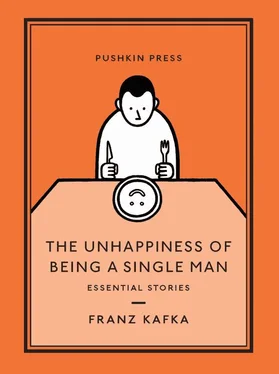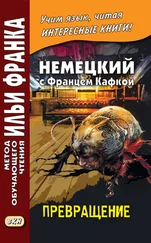“This is cotton wool?” asked the researcher, and leant forward.
“Yes, absolutely,” the officer said with a smile, “feel it for yourself.” He took the researcher’s hand and moved it across the bed. “It’s been specially prepared, that’s why it looks a little different than usual; I’ll come on to what that’s for later on.” The researcher had been slightly won over by the machine; shielding his eyes against the sun, he looked up at the top of the apparatus. It was a big construction. The bed and the engraver were the same size and looked like two dark troughs. The engraver was about two metres above the bed; the two parts were connected at the corners by brass poles that shone in the sunshine. Between the two troughs, the harrow was suspended from a steel chain.
The officer had hardly noticed the researcher’s previous indifference, but he certainly picked up on his growing interest and paused his explanation to give the researcher more time to examine the machine. The condemned man copied the researcher; since he couldn’t put his hand over his eyes, he squinted up at the top of the machine.
“So the man lies there,” said the researcher, then leant back in his chair and folded one leg over the other.
“Yes,” said the officer, pushing his cap back on his head and wiping his hand down his overheated face. “Now, listen carefully. Both the bed and the engraver are equipped with their own electric battery; the bed needs one for itself, the engraver’s is for the harrow. As soon as the man is tightly fastened, the bed starts to move. It vibrates by making tiny, rapid movements from side to side, and up and down. You’ll have seen similar equipment in mental hospitals; the difference is that with this machine, every movement has been precisely calculated; each one has to correspond precisely to the movement of the harrow. And it’s the harrow that actually carries out the sentence.”
“What is the sentence?” asked the researcher.
“You don’t know that either?” said the officer in astonishment, and bit his lip. “Excuse me, please, if I’ve been getting ahead of myself in the explanation; I’m very sorry about that. You see, the commandant used to give the explanation himself; the new commandant has given up that honourable duty; but the idea that he would fail to explain sentencing to such an eminent visitor”—the researcher tried to fend off this compliment with both hands, but the officer insisted on using that phrase—“that he wouldn’t even tell such an eminent visitor, that’s something new, and it”—he had a curse on the tip of his tongue, but he pulled himself together and just said: “I wasn’t told, the fault isn’t mine. And as it happens, I’m the person best placed to explain our sentencing because, right here,”—he patted his breast pocket—“I’ve still got the old commandant’s original sketches.”
“Sketches by the old commandant himself?” asked the researcher. “Was there anything he couldn’t do? Was he really a soldier, a judge, a builder, a chemist and a draughtsman?”
“Yes, indeed,” said the officer, nodding with a fixed, pensive expression. He inspected his hands; they didn’t strike him as clean enough to touch the sketches, so he went to the bucket and washed them again. Then he pulled out a small leather portfolio and said: “Our sentence doesn’t sound particularly severe. The condemned man has the law he has broken written onto his skin with the harrow. This man, for example”—the officer gestured towards him—“will have inscribed onto his skin: Respect your superior officers!”
The researcher glanced across at the condemned man when the officer pointed at him; his head was lowered and he seemed to be straining his ears to try and understand at least some of what was going on. But the shapes he formed with his rubbery lips made clear that he hadn’t understood anything at all. The researcher had wanted to put several questions to the officer, but looking at the man, he just asked, “Does he know his sentence?”
“No,” said the officer, and was about to carry on with his explanation when the researcher interrupted him: “He doesn’t know his own sentence?”
“No,” the officer said again, paused for a moment as if to let the researcher clarify his reasons for asking that, then added: “It would be pointless to tell him. He’s going to get it written on his own skin.”
The researcher would have let it go, but he felt the condemned man look across at him; he seemed to be asking whether the researcher could condone the procedure he’d just had explained. So the researcher, who’d already leant back in his chair, shifted forward again and asked, “But that he’s been sentenced for something, surely he knows that?”
“Not that either,” said the officer, and smiled at the researcher as if starting to expect peculiar comments from him.
“No,” said the researcher, wiping his hand across his forehead. “So this man also doesn’t know whether his defence was successful?”
“He hasn’t been given an opportunity to defend himself,” said the officer, glancing off to the side as if he were speaking to himself and didn’t want to embarrass the researcher by telling him such obvious things.
“But he must have had some opportunity to defend himself,” said the researcher, and stood up from his chair.
The officer saw the danger that his explanation of the machine’s workings would be considerably delayed; he went over to the researcher, took him by the arm and pointed at the condemned man, who, now that he was plainly being discussed, stood to attention while the soldier pulled his chains taut. The officer said, “The way it works is this. I’ve been appointed judge here in the penal colony. Despite my youth. Because I helped the old commandant on all punishment-related matters and also because I know the machine better than anyone else. The principle on which I make my decisions is this: the defendant’s guilt is never in doubt. Other courts can’t follow that principle because they have more than one member and they also have higher courts above them. It’s not like that here, or at least it wasn’t under the old commandant. The new one, admittedly, has shown some signs of wanting to interfere in my court, but I’ve managed to hold him off so far, and I should be able to keep that up. — You wanted to have this case explained; it’s as simple as they all are. This morning, a captain reported that this man, who’s assigned to him as a steward and sleeps in front of his door, slept straight through one of his duties. You see, he’s supposed to get up on the hour and salute in front of the captain’s door. Hardly an onerous duty and certainly a necessary one, because it keeps him fresh both for his guard duty and as a steward. Last night, the captain wanted to check whether this man was discharging his duty properly and found him crouched down, fast asleep. He fetched his riding crop and hit him across the face. Instead of getting up and begging for forgiveness, this man grabbed his superior officer by the legs and shouted: ‘Throw away the whip or I’ll eat you.’ — Those are the facts. The captain came to me an hour ago, I took down his statement and wrote out the judgment. Then I had the man put in chains. It was all very straightforward. If I’d first made the man appear in front of me and questioned him, it would only have created confusion. He would have lied, and if I’d managed to catch him lying, he would have told different lies, and so on. This way I’ve got him and won’t let him go again. — Does that answer your questions? We’re running a bit behind, the execution should have begun already, and I haven’t finished explaining how the machine works.” He urged the researcher to sit back down in the chair, and continued: “As you can see, the harrow matches the shape of a person; this is the harrow for the upper body; these are the harrows for the legs. For the head, there’s only this little spike. Is that all clear?” He bent down to the researcher and smiled encouragingly, ready to explain in any amount of detail.
Читать дальше












